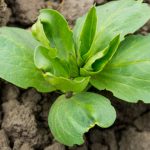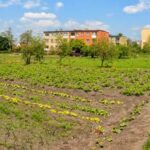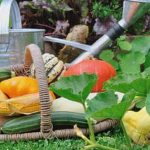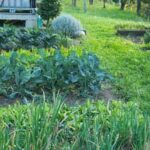Rubber mulch is a popular choice for many gardeners, but there is a growing concern about its safety when used in vegetable gardens. The question “is rubber mulch safe for vegetable gardens” has been the subject of much debate and research.
In this article, we will explore the purpose of rubber mulch in gardening, its benefits, potential concerns about its safety in vegetable gardens, research and studies on the topic, how to mitigate any potential risks, as well as alternative mulch options.
Rubber mulch is a type of mulching material made from recycled rubber tires. Its purpose in gardening is to provide insulation and protection for plants while conserving soil moisture and suppressing weed growth. This makes it an attractive option for both residential and commercial vegetable gardens.
When it comes to using rubber mulch in vegetable gardens, there are several benefits to consider. These include its long lifespan, low maintenance requirements, and ability to suppress weeds effectively. Additionally, rubber mulch can help improve soil moisture retention and regulate temperature fluctuations – all factors that can contribute to the success of a vegetable garden. However, despite these advantages, there are also potential concerns regarding its safety when used in close proximity to food crops.
As the use of rubber mulch becomes more prevalent in vegetable gardens, there are growing concerns about its safety due to the chemicals present in tires such as zinc, lead, cadmium, and other potentially harmful substances. In the following sections of this article, we will explore these concerns further and discuss how they can be mitigated through proper selection and application of rubber mulch or by considering alternative options for vegetable gardens.
Benefits of Using Rubber Mulch in Vegetable Gardens
Rubber mulch is a type of mulch made from recycled rubber, typically from old tires. Its purpose in gardening is to help retain moisture in the soil, suppress weed growth, and regulate soil temperature. In vegetable gardens, using rubber mulch can provide several benefits that make it an attractive option for gardeners.
Some of the benefits of using rubber mulch in vegetable gardens include:
1. Weed suppression: Rubber mulch forms a protective barrier that helps prevent weeds from growing, reducing the need for manual weeding and the use of chemical herbicides.
2. Moisture retention: The mulch helps the soil retain moisture, reducing the frequency of watering needed for vegetable plants.
3. Insulation: Rubber mulch insulates the soil, helping to keep it warm during cooler periods and protecting plant roots from temperature fluctuations.
Many gardeners are hesitant to use rubber mulch in their vegetable gardens due to concerns about its safety. One of the main concerns is whether chemicals from the rubber could leach into the soil and be absorbed by the plants. Additionally, there is worry about potential contamination of edible crops with harmful substances found in rubber.
In recent years, research and studies have been conducted to address these concerns and determine whether rubber mulch is safe for use in vegetable gardens. Some studies have found that while trace amounts of certain chemicals may leach from rubber mulch, they are present at levels far below any known health risk thresholds for humans or plants when used as directed. Nonetheless, it is crucial always to exercise caution when using rubber mulch in vegetable gardens.
Potential Concerns About the Safety of Rubber Mulch in Vegetable Gardens
Rubber mulch is a popular choice for many gardeners due to its durability, low maintenance, and ability to suppress weeds. However, there are some potential concerns about the safety of using rubber mulch in vegetable gardens. It is important for gardeners to be aware of these potential issues in order to make informed decisions about whether or not to use rubber mulch in their vegetable gardens.
One of the main concerns about using rubber mulch in vegetable gardens is the presence of toxins and chemicals that may be found in the rubber material. These chemicals can potentially leach into the soil and be absorbed by the vegetables, leading to potential health risks for those who consume them. Additionally, there is also concern about whether rubber mulch can affect the pH levels of the soil, which can impact the growth and health of the plants.
To mitigate these potential risks, it is important to thoroughly research and choose a high-quality rubber mulch product that has been specifically designed for use in vegetable gardens. Look for options that are labeled as non-toxic and free from harmful chemicals. It is also recommended to create a barrier between the rubber mulch and the soil by using a landscape fabric or plastic liner to prevent direct contact between the two materials.
Furthermore, regularly monitoring the pH levels of your soil and conducting regular soil tests can help identify any changes that may occur as a result of using rubber mulch. If you notice any adverse effects on your vegetable plants or soil quality, it may be necessary to consider alternative mulching options for your garden. Taking these precautions can help ensure that using rubber mulch in your vegetable garden is done safely and responsibly.
– Alternative Mulch Options:
- Straw
- Grass clippings
- Leaves
Research and Studies on the Safety of Rubber Mulch for Vegetable Gardens
Rubber mulch is a popular choice for gardeners looking to control weeds, retain soil moisture, and improve the overall appearance of their vegetable gardens. However, there have been concerns raised about the safety of using rubber mulch in vegetable gardens. Many gardeners want to know if rubber mulch is safe for use around their edible plants, and whether it poses any potential risks to human health.
Several studies have been conducted to address these concerns and determine the safety of rubber mulch in vegetable gardens. One study published in the Journal of Environmental Quality found that the chemicals used in the production of rubber mulch, such as zinc, lead, and other heavy metals, can leach into the soil over time. This raised concerns about the potential contamination of vegetables grown in soil with rubber mulch.
Another study conducted by the Connecticut Agricultural Experiment Station found that rubber mulch contains toxic substances that could pose a risk to both humans and animals if ingested. The study also noted that rubber mulch can release harmful volatile organic compounds (VOCs) into the air under certain conditions, further raising concerns about its safety for use in vegetable gardens.
Despite these findings, it’s important to note that not all research on rubber mulch has resulted in negative conclusions. Some studies have shown mixed results regarding the safety of using rubber mulch in vegetable gardens. It is therefore essential for gardeners to stay informed about current research and make an informed decision based on their own comfort level with potential risks.
How to Mitigate Any Potential Risks of Using Rubber Mulch in Vegetable Gardens
Rubber mulch is a popular choice for many gardeners, as it provides a number of benefits. However, there are some potential concerns about its safety, particularly when used in vegetable gardens. Many people wonder if rubber mulch is safe for vegetable gardens given the possibility of chemical leaching and its non-biodegradable nature.
Research has shown that rubber mulch can indeed contain harmful chemicals such as lead, zinc, and PAHs (polycyclic aromatic hydrocarbons), which are known to be toxic to plants and detrimental to soil health. When considering the use of rubber mulch in a vegetable garden, it is important to take these factors into account and consider how to mitigate any potential risks.
To mitigate the risks of using rubber mulch in vegetable gardens, one option is to use a barrier such as landscape fabric between the soil and the rubber mulch. This will help prevent direct contact between the mulch and the soil, reducing the risk of chemical leaching. Additionally, choosing a high-quality rubber mulch product that has been tested for safety can also help mitigate any potential risks.
One study found that while some types of rubber mulch can pose risks to plant growth and soil health due to leaching of harmful chemicals, others have been found to have minimal impact when properly installed and maintained. Therefore, it is crucial for gardeners to be informed consumers and do their research before deciding on whether or not to use rubber mulch in their vegetable gardens.
| Concerns About Rubber Mulch | Mitigation Strategies |
|---|---|
| Harmful chemicals present | Use landscape fabric barrier |
| Potential leaching into soil | Choose high-quality tested products |
| Varying impact on plant growth | Be an informed consumer; do research before using |
Tips for Choosing and Applying Rubber Mulch in Vegetable Gardens
Choosing the right type of rubber mulch for your vegetable garden is crucial to ensuring the safety and success of your crops. Here are some tips for selecting and applying rubber mulch in your vegetable garden.
Consider the Source
When choosing rubber mulch for your vegetable garden, it is important to consider the source of the material. Look for rubber mulch that is made from recycled tires, as this helps to reduce waste and environmental impact. Additionally, opt for rubber mulch that is free from harmful chemicals and toxins, as these can leach into the soil and potentially affect the safety of your vegetables.
Thickness and Application
The thickness of the rubber mulch layer is important when it comes to its effectiveness in weed suppression and moisture retention. Aim for a layer that is around 2-3 inches thick to provide adequate coverage. When applying the rubber mulch, be sure to create a barrier between the mulch and the soil by using a landscape fabric or plastic sheeting to prevent direct contact with the soil.
Maintenance and Replacement
Regular maintenance of your rubber mulch is essential to ensure its longevity and effectiveness. Keep an eye out for any signs of deterioration, such as fading or crumbling, as these can indicate that it’s time for a replacement. Inspect the area underneath the rubber mulch regularly to check for any signs of soil compaction or nutrient depletion.
By following these tips for choosing and applying rubber mulch in your vegetable garden, you can make an informed decision that promotes both the health of your plants and the safety of your produce. However, always remember to consider other alternative options if you remain unsure about whether rubber mulch is safe for vegetable gardens.
Alternative Mulch Options for Vegetable Gardens
When it comes to mulching your vegetable garden, there are several alternative options to consider aside from rubber mulch. Each type of mulch has its own set of advantages and considerations, so it’s important to weigh your options carefully before making a decision.
Organic Mulch
One popular alternative to rubber mulch is organic mulch, which includes materials such as straw, wood chips, grass clippings, and compost. Organic mulch is beneficial for vegetable gardens because it breaks down over time, adding nutrients to the soil. It also helps retain moisture, suppress weeds, and regulate soil temperature. When choosing an organic mulch for your vegetable garden, consider factors such as availability, cost, and the specific needs of your plants.
Gravel or Stone Mulch
For those looking for a longer-lasting option, gravel or stone mulch can be a suitable alternative to rubber mulch. This type of mulch does not break down like organic materials do and can provide good drainage for vegetable plants. However, keep in mind that gravel or stone mulch may not be ideal for all vegetables and could potentially heat up too much in the sun.
Newspaper or Cardboard Mulch
Another eco-friendly alternative to rubber mulch is newspaper or cardboard mulch. These materials are effective at suppressing weeds and retaining moisture in the soil. They also decompose over time and can improve the overall soil structure of your vegetable garden. When using newspaper or cardboard as mulch, make sure to layer it thickly enough to prevent sunlight from reaching the soil and allow plants to grow through openings.
Considering these alternative options can help you make an informed decision about the best type of mulch for your vegetable garden while considering if rubber mulch is safe for your gardening needs.
Conclusion
In conclusion, the use of rubber mulch in vegetable gardens can be a divisive topic. While there are certainly benefits to using rubber mulch, such as its longevity and ability to retain moisture, there are also concerns about its safety and potential risks. It is important for gardeners to weigh the pros and cons before making a decision on whether or not to use rubber mulch in their vegetable gardens.
Research and studies have attempted to address the question “is rubber mulch safe for vegetable gardens?” Some studies have raised concerns about the leaching of chemicals from rubber mulch into the soil, while others have found no significant risk. Despite this conflicting information, it is advisable for gardeners to take precautions when using rubber mulch, such as choosing a reputable source for the product and monitoring soil quality regularly.
Ultimately, if gardeners are hesitant about using rubber mulch in their vegetable gardens, there are alternative options available. Organic mulches like straw, wood chips, or shredded leaves can provide similar benefits without the potential safety concerns associated with rubber mulch. By staying informed and considering all available options, gardeners can make a confident decision that aligns with their gardening practices and values.
Frequently Asked Questions
What Is a Negative About Rubber Mulch?
One negative aspect of rubber mulch is that it does not decompose and enrich the soil like organic mulches. It also doesn’t provide beneficial nutrients to plants as it breaks down.
Does Rubber Mulch Leach Into the Soil?
Rubber mulch can leach chemicals into the soil over time, potentially impacting plant growth. While some studies have shown minimal leaching, it’s still a concern for many gardeners and environmentalists.
What Is the Best Mulch for a Vegetable Garden?
The best mulch for a vegetable garden is organic and natural, such as straw, grass clippings, or compost. These types of mulch provide nutrients to the soil as they break down and help retain moisture, creating an ideal environment for vegetable growth.

If you’re looking to get into vegetable gardening, or are just looking for some tips on how to make your current garden better, then you’ve come to the right place! My name is Ethel and I have been gardening for years. In this blog, I’m going to share with you some of my best tips on how to create a successful vegetable garden.





